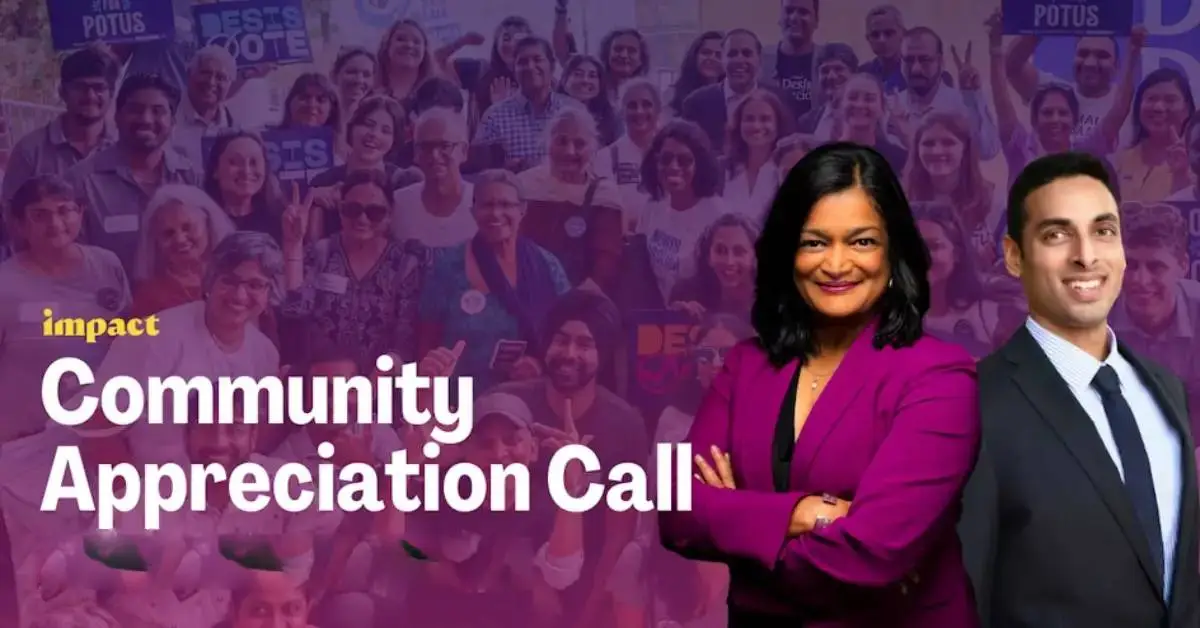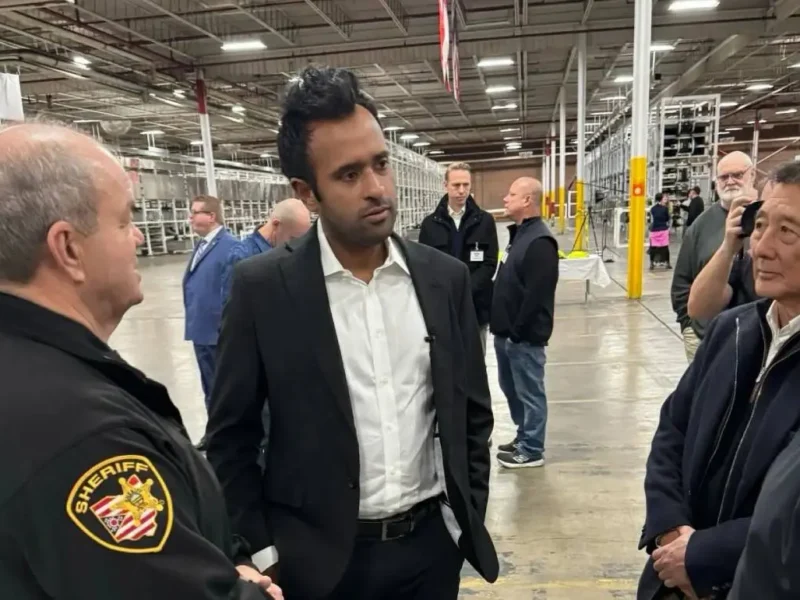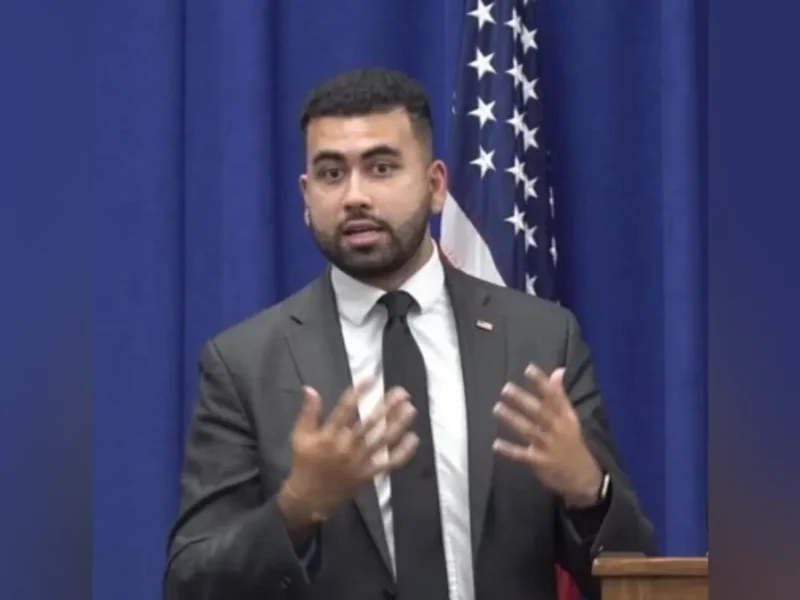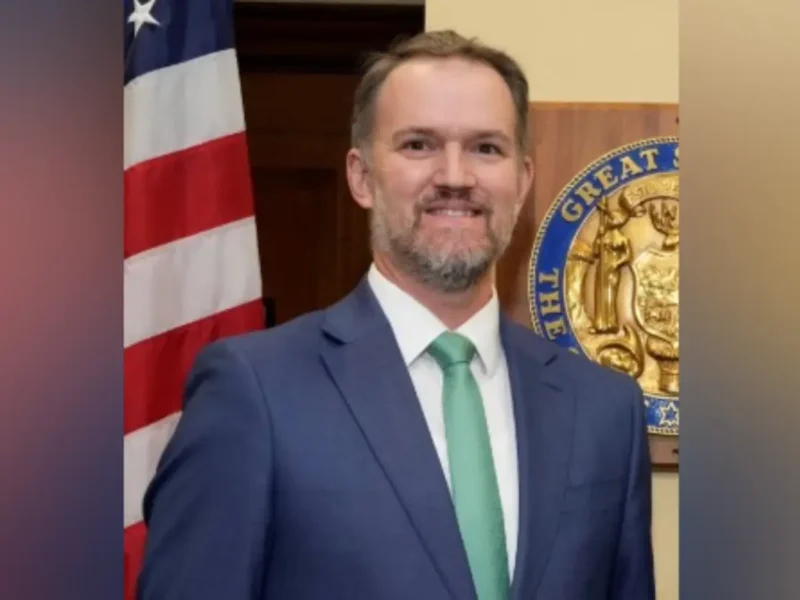Pramila Jayapal: We May Have Been Knocked Down, But We Have Not Been Knocked Out
By REENA RATHORE
WASHINGTON, DC – Indian American Congresswoman Pramila Jayapal delivered a rousing call to action during a post-election debrief organized by the Indian American Impact Fund, reflecting on the collective achievements of the South Asian community while urging resilience in the face of political challenges. Her speech capped a gathering aimed at celebrating the power of grassroots mobilization in energizing communities and charting a path forward after the recent election cycle.
“Let’s show this new administration, how strong our Desi resistance can be and how strong our Desi vision is,” stated Jayapal. “And the biggest power is the power of organizing, the power of your voice, the power of the ability to continue forward even when you’ve been knocked down. Because we may have been knocked down, but we have not been knocked out.”
Adding on to that Chintan Patel, executive director of the Impact Fund, said: “We have to continue doing this work. We have no option to retreat. We cannot go back to a world where we let others decide what happens to our families and our communities.”
The Indian American Impact Fund’s “Desi President” initiative aimed to channel South Asian political power not just to support Harris’ candidacy but to inspire long-term civic engagement rather than short-term wins.
Addressing a virtual room of advocates, community members and volunteers, Jayapal lauded the transformative work spearheaded by the Indian American Impact Fund during Vice President Kamala Harris’ campaign. “Your incredible work in swing states across the country,” Jayapal said, “investing over $8 million to elect Kamala Harris and South Asian candidates across the country, a $3.5 million TV, digital, radio ad…that is amazing.” She noted the unprecedented scale of outreach efforts, which involved more than 2,300 volunteers who were able to reach over 180,000 South Asian voters in battleground states like Pennsylvania, Michigan, North Carolina, and Georgia, saying “even though the outcome of the presidential isn’t what we wanted, it really mattered that you were out there.”
Despite the loss of the presidential race, Jayapal emphasized key victories: retaining a critical Senate seat in Michigan, the North Carolina governor’s mansion, and bolstering down-ballot successes. These wins, she argued, are “real bright lights” that spotlight South Asians’ growing representation in state legislatures and Congress, citing trailblazers like Suhas Subramanyam, Virginia’s first Indian American Congressman-elect; Renuka Mayadev, the first South Asian in the Wisconsin State House; Hanadi Nadeem, who is joining the Nevada State House; Darshana Patel, who’s joining the California Assembly; and Danny Avula, who will be the first South Asian mayor of Richmond, Virginia, as examples.
Subramanyam, representing Virginia’s 10th district, shared his gratitude and determination to push forward despite broader national setbacks. “These things go in cycles and the way forward is to call out all the bad things that happen for what they are and to just fight back… Every time we’re down, we bounce back,” he said.
Emphasizing the tangible progress made in mobilizing South Asian voters, Patel celebrated the volunteers’ efforts, underscoring their role in making nearly 90,000 phone calls to battleground South Asian and AAPI voters, knocking on about 32,000 doors, sending over 3,000 WhatsApp messages, and distributing 25,000 handwritten postcards in a short three-and-a-half-month campaign.
Beyond the numbers, the campaign fostered a broader vision. “One of the most critical parts of this election,” Patel reflected, “wasn’t simply the opportunity to elect the first South Asian woman president, but that our community had the power to do that….not just in this election, but in elections to come.” The event underscored the community’s evolving political awareness, with prominent figures like Maryland’s Lieutenant Governor Aruna Miller, Congressman Raja Krishnamoorthi, and cultural icons such as Padma Lakshmi lending their voices to the campaign.
Jayapal shared personal anecdotes from her activism, including leading protests against the Muslim ban and defending the Affordable Care Act, as evidence that perseverance and hope can yield lasting change.
“We know that big fights can’t be fought only when we win or only when it’s convenient,” she said, encouraging the audience to prepare for upcoming battles, particularly against policies that threaten civil rights and democratic values.
“I promise you, right alongside you, I’m going to be a ferocious defender of our communities. We will defend immigrant rights, women’s rights, LGBTQ rights. We will stand up for justice, peace, and equality,” she reiterated. “There are 45 federal judicial vacancies, and the Senate is working to try and fill these as quickly as possible with qu0alified candidates who respect our democracy and our Constitution. We’re also working with the White House to take as many executive actions that prepare for a Trump presidency by protecting civil rights and workers’ rights and reproductive rights and more.”
Taher Hasanali, national political and organizing director, Impact Fund, delved into the numbers from states like North Carolina, specifically Wake County, to demonstrate how targeted canvassing and phone banking efforts energized the South Asian voter base.
Weekly canvassing, in partnership with local organizations like They See Blue North Carolina, showed an increase in voter turnout and shifts in precinct-level support. He credited the volunteers’ ability to engage low-propensity voters and build trust within the community for these gains. “Even though we don’t necessarily see the impact on a national level with the federal and the presidential election result… change happens over time,” he remarked.
A highlight of the event was the recognition of volunteers who powered the ground game especially first-time volunteers who stepped out of their comfort zone to phone-bank, knock on doors, and engage in conversations about the election.
Lata, a seasoned volunteer from Ohio, offered a heartfelt pep talk and stressed the importance of persistence and the meaningful impact of every action — from phone calls to postcards.
“This was my sixth presidential election,” she noted, adding that while the loss was difficult for first-time volunteers, it should not deter them. “Don’t give up. The pendulum swings and tomorrow will be another day,” she said.
Speakers pointed out the importance of local and state-level activism, asking participants to focus not only on candidates but also on critical issues like education and community well-being. The unifying theme was that the campaign was more than just politics — it was about building a sense of shared purpose.
While the South Asian community fell short of seeing the first female South Asian president elected, other victories stood out, said Hasanali. The Indian American Impact Fund celebrated the success of 35 South Asian candidates — which it endorsed — in races ranging from local government to Congress. Many of these leaders broke new ground, such as serving as legislative whips or holding other leadership roles in state legislatures.
Sarah Shah, senior director of strategic communications and partnerships, Impact Fund, made it clear they are gearing up for battles ahead, starting with critical elections in Virginia and New Jersey in 2025 and expanding to the 2026 midterms. “There’s no such thing as an off year,” she noted.
The organization reaffirmed its commitment to building political power within the South Asian community while fostering intentional allyship with other marginalized groups. It is also exploring ways to engage South Asian voters who supported President Donald Trump.
Campaigning and activism take a toll, a reality not lost on the advocacy group. Acknowledging the emotional and physical intensity of the recent campaigns, Patel urged participants to “recharge, rejuvenate, and then please come back to the fight because we need each and every one of you all engaged in the work going forward.”





Mouli
/
It is because of politicians like you who took the party to extreme left philosophy, that we lost the election. Continuing in the same path and giving a war cry to do so will doom the Democratic party for good. If that’s what you want, you will get it sooner than later.
November 21, 2024